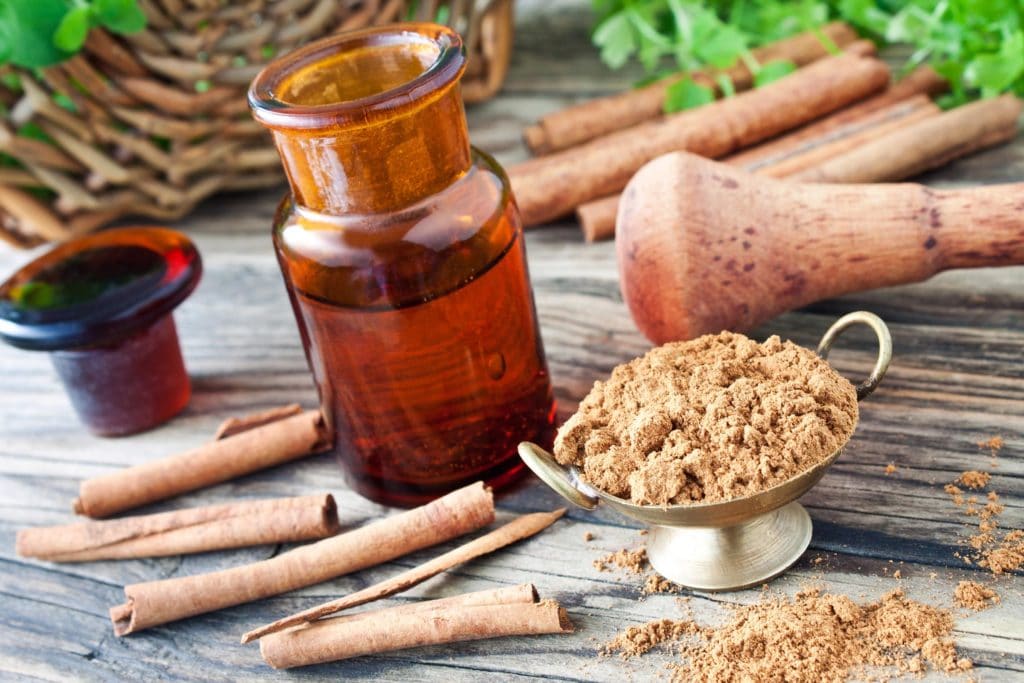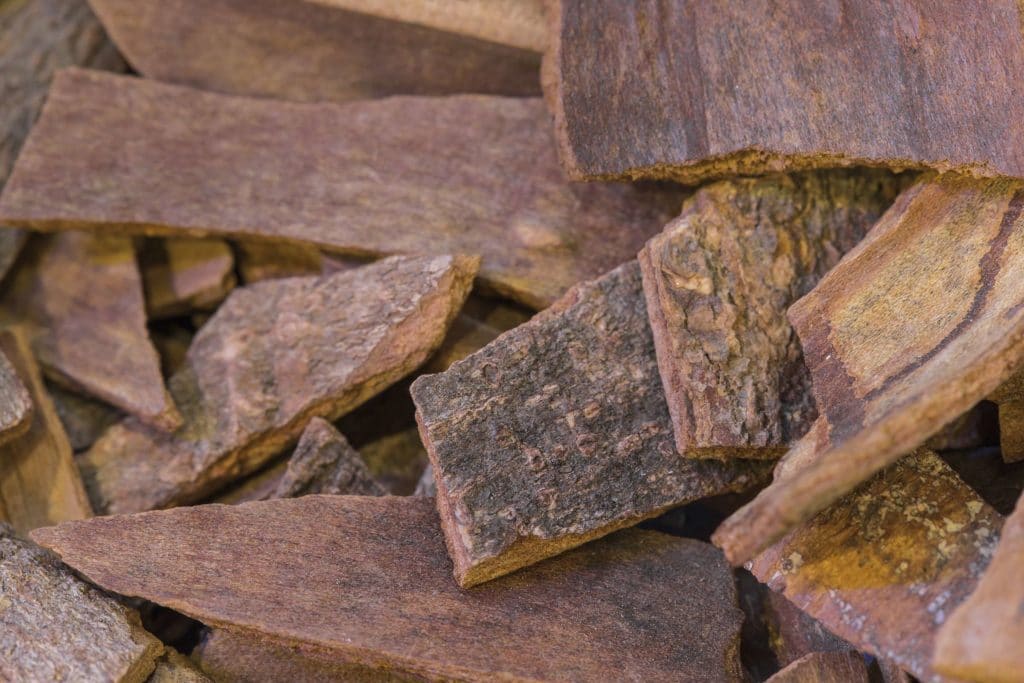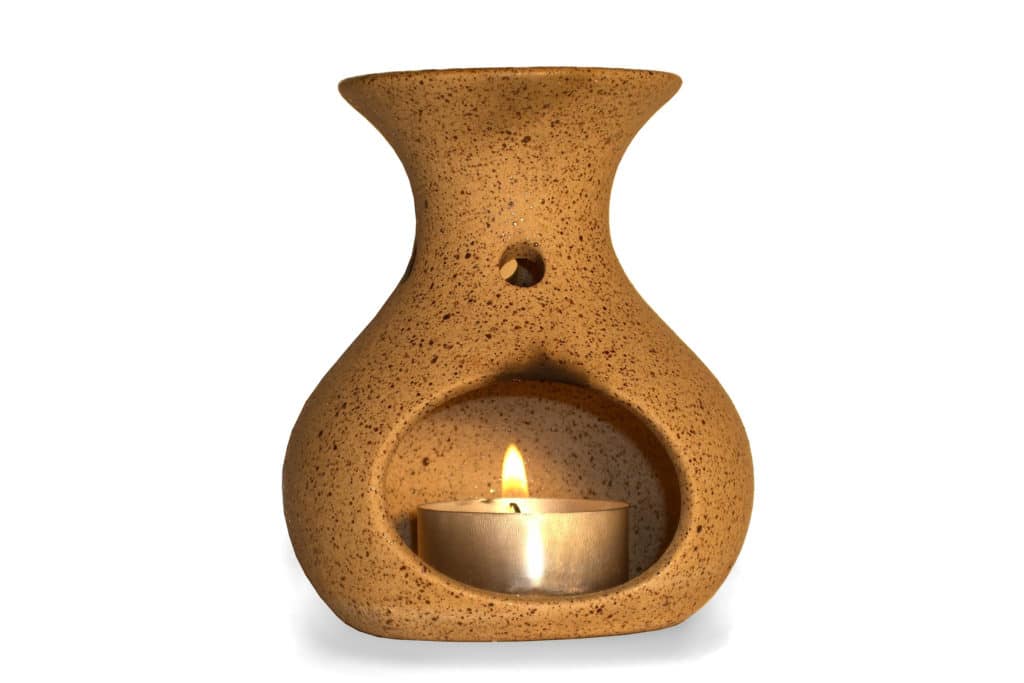From the cinnamon bark is distilled with water vapor cinnamon oil. From a kilogram of bark about five grams of the Zimtöls. This is a yellowish transparent and discolored in the course of time, pale red. It smells of cinnamon, tastes sweet and sharp. It is easy to mix with alcohol. The main active ingredient in the Zimtöls is cinnamic aldehyde. The Oil from the leaves of the cinnamon tree, however, contains mainly Eugneol.
Table of contents
Overview
- Cinnamon oil means the Oil from the cinnamon bark and the cinnamon leaves. Zimtkassienöl is obtained from the Cassia.
- The main ingredients are cinnamon aldehyde and Eugenol.
- Cinnamon oil is as a fragrance oil, seasoning and cleaning agents.
- It is a strong allergen.
- Cinnamon oil is effective against bacteria, viruses and fungi and is effective in infections, and cramps.
- It is a traditional pain reliever, especially for menstrual pain and rheumatoid complaints.

Cinnamon or Cassia?
Often with the Oil of true cinnamon tree, confused, Zimtkassienöl won, however, by distilling the bark of the Cassia. It smells similar to cinnamon, is brownish as a real cinnamon oil, less sharp. In addition, it contains more coumarin, and health is, therefore, that are harmful. It combines well with alcohol, and its main component is cinnamaldehyde.
Allergological Problems
Cinnamic aldehyde is a high allergen, Zimtöle trigger, therefore, often allergies. It should also be Non-allergic people can never pure on the skin applied, but always in a mixture with a carrier oil. Also the Information network of Dermatological clinics (IVDK) classifies cinnamon oil as a fragrance substance with a high allergenic potential.
What is the effect of cinnamon oil?
Cinnamon oil purifies the blood, relieves spasms, stimulates, warms, relaxes and soothes the blood in wounds.
How to make cinnamon oil?
Cinnamon oil makes the inside hot, because it stimulates the flow of blood. For this you can resolve, for example, a drop of the Oil in hot tea or cocoa. In an aroma lamp, it is suitable to clean the air in the room. Cinnamon oil has a strong effect against bacteria. A few drops of Oil on a damp wash cloth is suitable to spread a pleasant fragrance and kill bacteria.
Which ingredients contains cinnamon oil?
In addition to the cinnamon aldehyde contains cinnamon oil
- Cineol,
- Cinnan-Aldehyde,
- Cymene,
- Eugenol,
- Fufurol,
- Linalool,
- Phellandrene
- and pinene.
Eugenol
The effect of the Zimtöls as a Microbicide is mainly due to the Eugenol. This is except in the cinnamon oil in the Oil of cloves, as well as in allspice and in small quantities in black pepper, Bay leaf and Basil. The highest proportion is in the clove oil, which also explains why this is in the dentistry, important. Eugenol relieves pain and inhibits inflammation. It has a spicy taste that is typical of Oriental dishes, and provides the Basis for artificially produced Vanillin. Eugenol is effective against bacteria and fungi, but also against other pests such as worms, mites, and ticks.
Cinnamic aldehyde
Cinnamic aldehyde can be in any proportion with Ethanol and diethyl ether mix. It is irritating to the skin and the eyes. Be careful with cinnamon oil in children! Exposed to air, is oxidized to cinnamaldehyde to cinnamon on the duration of acid. Aluminum isopropoxide in Isopropanol makes from cinnamon aldehyde, alcohol, Cinnamon.

The scent of the Zimtöls
Cinnamon oil we used because of its healing effect, but also because of the fragrance, the perfume experts as a sweet, warm, and sense of call. Cinnamon oil benefits are many people in order to pass gloomy moods. To do this, two drops of cinnamon oil and four drops of orange oil should be enough in a fragrance lamp. Artists cinnamon has the reputation to increase the creativity. Cinnamon oil’s supposed to help with Concentration, and even mild depression how to fix can motivate. In fragrance lamps, it not only sells the bad mood, but it is also suitable for insects to hold out even against mosquitoes effectively. The scent of the Zimtöls with harmony
- Lime,
- Grapefruit,
- Orange,
- Tangerine,
- Ginger,
- Patchouli,
- Daffodil
- and Jasmine.
Healing effects
In the case of the healing effect of cinnamon oil it is not superstition, because the effect of the Zimtrindenöls is scientifically proven. It has antibacterial, anti-fungal and anti-infectious. In fragrance lamps are used, it not only improves the room fragrance, but also combats viruses and bacteria in the air and prevents infections of the respiratory tract. Cinnamon oil acts as astringent. It helps against inflammation of the urinary tract. Cinnamon also acts as an antiseptic.
Against Intestinal Diseases
Cinnamon oil helps against flatulence, and is effective against intestinal parasites. Taken with food it AIDS digestion and can help with stomach discomfort and abdominal pain. It can be helpful in inflammation in inflammation of the bowel, to Detoxify the intestine, in intestinal catarrh, in General, intestinal diseases, or in the case of a colon, and small intestine.
Pain relievers and expectorants
Cinnamon oil helps against menstrual pain and generally acts as a pain reliever. Therefore, it is also a drug for rheumatoid Arthritis. Cinnamon oil dissolves mucus in the throat and the respiratory tract.
Against Fungi
As an anti-fungal, and cinnamon oil can be used not only against fungal infections on the skin, but also to clean the apartment of mold.

Bleeding and wound infection
Cinnamon bark oil stops bleeding. Dissolved in a mouthwash, it helps against bleeding gums. Cinnamon balm is good against the bleeding of cuts while Shaving. It not only stops the bleeding, but also prevents infection of the wound.
Oil of cinnamon in Diabetes
Cinnamon oil has actually the blood sugar lowering effect, however, it can be difficult to control. Since Diabetes is a Medication that is tailored to your Diabetes type, it is not advisable to make a additional self-medication with cinnamon oil.
How to make cinnamon oil to apply?
Cinnamon oil has many application possibilities, so it can be used as a component of a balm or cream used, for example, the skin to RUB. Also as a Bath additive or perfume, it can be used. Further possibilities of use of the Zimtöls are:
- Düftöl
Cinnamon has a “warm” fragrance, in the fragrance lamp, it kills also viruses and bacteria in the air and triggers coughing spasms. A good scent mixture, to clean the respiratory tract, consisting of Cinnamon bark oil, clove oil and thyme oil. - Massage oil
Cinnamon leaf oil promotes circulation, it must be dosed low, in that it is mixed with, for example, olive oil. The skin the increased blood flow a tinge of pink. - Mouth rinse
For a mouth rinse against gingival inflammation is cinnamon leaf oil is excellent as an antiseptic, which also acts an astringent. For this purpose give one to two drops of leaf oil of cinnamon in a Cup of warm water, one to two drops of clove oil and rinse your mouth with the mixture several times a day. - Insecticide
Cinnamon oil is an effective insecticide. Especially the cinnamon aldehyde, but also at least three other agents to kill insect larvae already at a very low concentration. Scientifically, the effect on mosquito larvae has been studied so far. Scientifically, the effect on adult mosquitoes is not documented yet, but is currently being investigated. As a home remedy against mosquitoes cinnamon oil is applied, however, been a long time in the fragrance lamp or as a balm. It is also found in products against house dust mites.

A tip for the summer: RUB the legs with a mixture, the Cinnamon bark oil contains. The Eugenol prevents ticks.
Side effects
Cinnamon oil should be used with Caution. As mentioned above, cinnamon oil can trigger allergies and should be applied therefore never pure on the skin. If it is taken in diluted Form orally, is also be treated with caution, because even a slight Overdose can lead to heart palpitations and digestive disorders. In pregnancy is not recommended from cinnamon oil entirely as it can lead to miscarriages. (Dr. Utz Anhalt)
